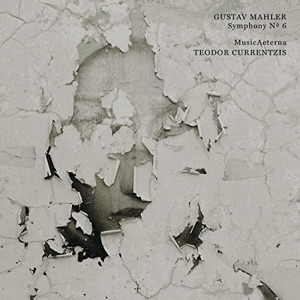Some of you may recall the shock and excitement that greeted Krystian Zimerman’s DG recording of the two Chopin piano concertos–a sort of exposé on what you can do with a hand-picked orchestra, rehearsed to within an inch of its life, and recorded in such a way that every single note seemed to have been polished to gleaming perfection. To some it was a revelation, to others it was a sterile exercise is musical narcissism, but say what you will, it was certainly interesting. Conductor Teodor Currentzis seems to have made this approach a matter of principle–in his recent Mozart opera recordings as well as Tchaikovsky’s Sixth Symphony, but here he’s got a problem.
Mahler isn’t Chopin, or Mozart, or Tchaikovsky. His music is enormously more complex in color and texture then theirs. Certainly he intends that everything essential be heard, but this doesn’t mean that every note and line is as important as every other. It’s a question of proportion. Currentzis has drilled his orchestra, the string section especially, to a point where the playing would shame many of today’s prestige ensembles. When it comes to the straightforward application of Mahler’s indicated accents and articulation, the result is often thrilling. Take the start of the first movement. Has this march ever sounded more menacing or relentless? I think not. The performance is worth hearing for this alone.
Then comes the second subject, the so-called “Alma” theme, and the music bogs down in fussy rubato–an overly generous application of Mahler’s minute suggestions to vary the pace. You begin to wonder: Currentzis may be a superb orchestra trainer, but is he really a conductor? All of the problems with this performance arise, not from any flaws in execution from the ensemble, but squarely from the podium. Beyond that sluggish first-movement second subject, they are easy to list, and largely of the same type:
1. In the scherzo, wisely placed second, Mahler marks the trio sections “Old Fashioned, markedly slower” and “Grazioso”. Currentzis is metronomic, and where Mahler asks the conductor to press forward naturally (Natürlich drängend) he takes off abruptly, shattering the mood.
2. The principal theme of the Andante, like the “Alma” tune, tends to get lost in micromanaged dynamics and balances that favor the strings at the expense of the woodwinds. It’s curiously inert. In the magical episode before the final climax that Mahler marks “Misterioso”, Currentzis presses forward most insensitively, with a resulting lack of atmosphere.
3. At the start of the finale (and elsewhere), Currentzis strangely has the deep bells and cowbells playing at the same time, rather than coloring their distinctive musical terrains, and at one point he seems to substitute the rute for Mahler’s suspended cymbal (just before the chorale at figure 106). Very strange. The two hammer blows are weak, but the hysterical reaction to them is sensational, the result being a classic case of effects without causes. The coda, too, sounds rushed and uninflected, with the final, theoretically devastating crash rendered ineffective by cavernous sonics that favor the strings at the expense of the woodwinds, brass, and percussion.
This isn’t a large list among many moments that really do deliver the goods, but what most of the above items have in common is a lack of feeling for atmosphere, color, and mood–in other words, for a critical aspect of Mahlerian stylistics.
If there’s a limit to what a fanatical approach to ensemble discipline can achieve, then I would argue that Currentzis likely has reached it here. It would be very interesting to hear what happens when he directs a major ensemble with limited rehearsal time and a strong corporate identity of its own. Make no mistake, in a world filled with egomaniacal conductors producing recordings with their proprietary ensembles, Currentzis stands out from the pack, and for that reason he’s worth hearing, if only as a sociological phenomenon. Whether or not he’s an insightful and satisfying exponent of Mahler’s Sixth Symphony, given the genuine time and effort that he obviously put into this performance, is difficult to say. For now, let’s give him the benefit of the doubt.
































